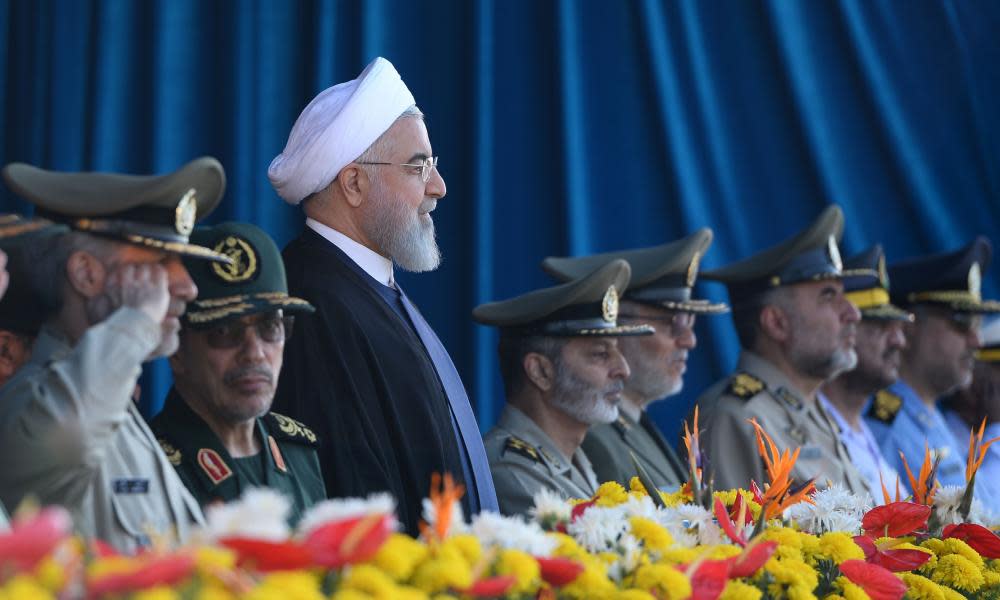John Bolton warns Iran not to cross the US or allies: 'There will be hell to pay'

The Trump administration has warned Tehran that there would be “hell to pay” if it continued to “cross” the US and its allies.
The threat was delivered by the national security adviser, John Bolton, a longtime Iran hawk who told an audience of anti-Tehran activists: “The murderous regime and its supporters will face significant consequences if they do not change their behaviour”.
“Let my message today be clear: we are watching, and we will come after you,” Bolton said, according to early excerpts from his speech obtained by the Axios news website.
He added: “If you cross us, our allies, or our partners; if you harm our citizens; if you continue to lie, cheat, and deceive, yes, there will indeed be hell to pay.”
The bellicose tone was in striking contrast to an early morning tweet from Donald Trump saying he was sure that the Iranian president was an “absolutely lovely man”.
Later in the day, however, Trump toughened his language, blaming “the corrupt regime” for the humanitarian catastrophe in Syria, and for embezzling billions of dollars of the Iranian people’s money.
US European allies however, refused to abandon a 2015 nuclear deal with Iran in the face of intense pressure to do so by Washington. Mike Pompeo expressed disappointment that European states had organised a parallel payments system as a way of bypassing US anti-Iran sanctions.
“This is one of most counterproductive measures imaginable for regional and global peace and security,” the US secretary of state said.
Administration critics have asked why the Trump administration was so focused on attacking Iran while lionising Kim Jong-un, the head of a dictatorship with a far worse human rights record than Iran, and which has a nuclear arsenal.
A few minutes before 7am on Tuesday, Trump sent out a tweet that appeared to offer the same very personal diplomatic channel to Rouhani as he established with Kim, saying “I am sure he is an absolutely lovely man!”
However, he added: “Despite requests, I have no plans to meet Iranian president Hassan Rouhani. Maybe someday in the future.”
Later in the day, Rouhani made clear that he had not asked to meet Trump and would not accept an invitation anyway.
“You don’t need a photo opportunity for a dialogue. We can have one at the UN assembly,” the Iranian president said in his own address, adding that the starting point for any negotiation would have to be the nuclear agreement Trump walked out of in May, declaring it “one of the worst deals I have ever witnessed”.
Shortly before he was due to address the UN general assembly, Trump qualified his complimentary remarks about Rouhani, saying: “I’m not meeting with them until they change their tune. It will happen. I believe they have no choice. We look forward to having a great relationship with Iran, but it won’t happen now.”
Foreign policy analysts suggested that the purpose of the tweet was to send the message that Trump was seeking a personal rapprochement with Rouhani, along the lines of his diplomacy with North Korea’s Kim.
“Trump used to occasionally sneak some less aggressive personal rhetoric toward Kim in, saying in 2017 that he would ‘be honored’ to meet. I think this is the first such example with the Iranians,” said Jarrett Blanc, a former senior state department official involved in Iran policy, now a senior fellow at the Carnegie Endowment for International Peace.
Randa Slim, director of conflict resolution at the Middle East Institute, said: “For Trump, negotiations are about personal relations and personal deals. He also believes that by the sheer force of his personality he could convince anyone to negotiate with him. Ideological considerations do not affect his negotiation calculus.
“As he did with the North Korean leader, he has been trying to establish a personal rapport with President Rouhani,” Slim added. “What Trump fails to understand is that in the case of Iran, Rouhani is not the decision maker about whether or not to negotiate with the US. [Supreme Leader Ali] Khamenei is.”
In May, Trump abrogated the 2015 multilateral nuclear deal with Iran, known as the Joint Comprehensive Programme of Action (JCPOA), defying European allies, Russia and China, the agreement’s co-signatories. The issue has become one of the sharpest rifts in transatlantic relations.
In the course of discussions with Washington, many European diplomats became convinced that Trump was so determined to kill off the JCPOA because it was the main foreign policy legacy of his predecessor, Barack Obama.
“If we called it the Trump Comprehensive Programme of Action, we wouldn’t be having these problems,” one diplomat remarked sourly.

 Yahoo News
Yahoo News 
